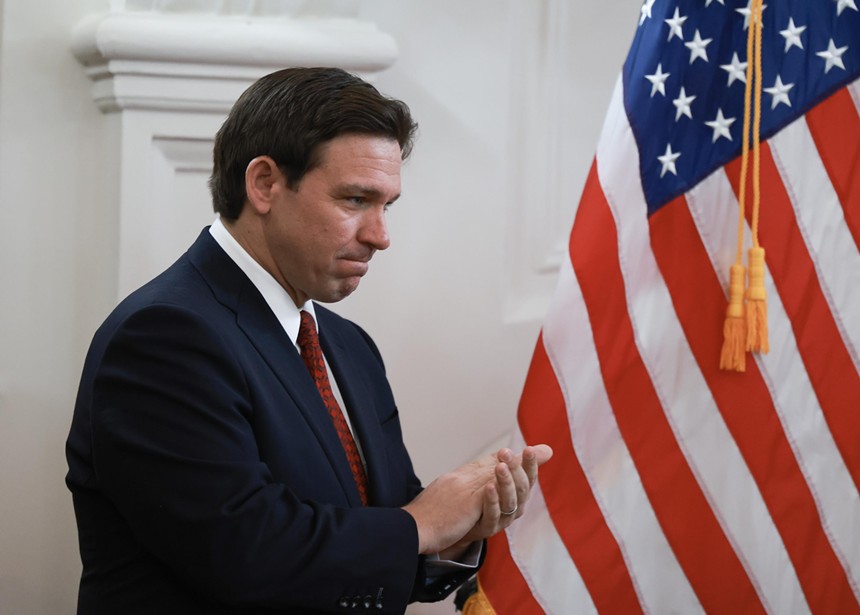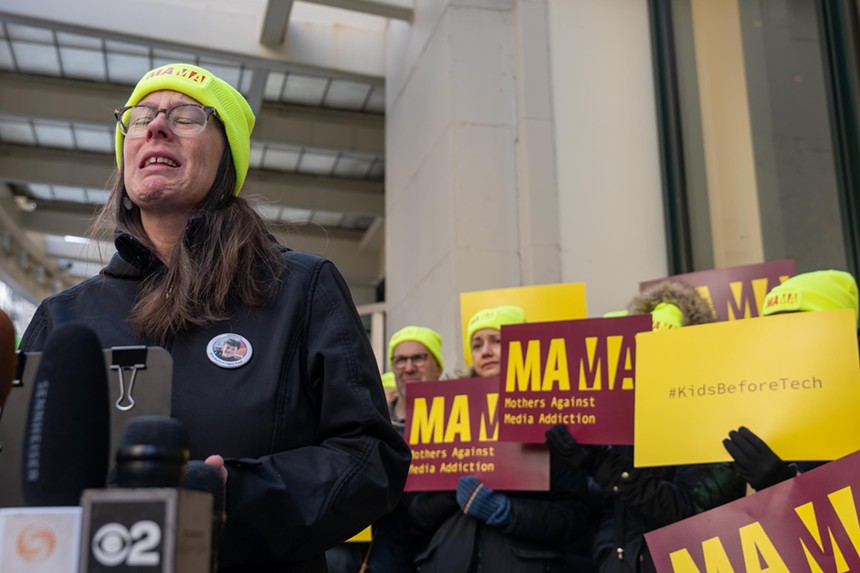But it remains to be seen whether the regulations will ever take effect.
First Amendment advocates and industry groups are waiting in the wings to file legal challenges, while some constitutional experts posit the law has a snowball's chance in hell of withstanding court scrutiny. In other states, comparable juvenile social media regulations are on hold owing to lawsuits claiming they blatantly violate young people's free speech.
Howard Wasserman, a law professor at Florida International University, is skeptical that a law as broad as Florida's can survive challenges on free speech grounds. He says that, just as there is a right to visit a bookstore and explore ideas in a novel, Americans have a right to visit a social media site and browse.
"There's a right to engage in and receive expression by whatever means that expression is going to be made or heard," Wasserman, a constitutional law author and SCOTUSBlog contributor, tells New Times. "The First Amendment protects at that level of generality."
Legislators have some legal leeway to pass laws that potentially tread on the First Amendment, though they face a tightrope walk through the federal court system. Courts will generally strike down content-based restrictions on speech unless they are driven by a "compelling government interest" and use the "least restrictive" means possible.
Florida House Speaker Paul Renner has defended the bill on the grounds that drastic measures were necessary to curb youth social media addiction.
"The internet has become a dark alley for our children where predators target them and dangerous social media leads to higher rates of depression, self-harm, and even suicide," Renner said in March upon the bill's signing. "Florida leads the way in protecting children online as states across the country fight to address these dangers."
Age-based social media restrictions have been cropping up around the nation in both blue and red states as lawmakers try to play regulatory catch-up in light of studies linking overuse of social media to psychiatric harm in young users.
In Florida, Democratic legislators voted overwhelmingly in favor of the new law.
Though the wave of social media regulations is a novel development, the question of how far lawmakers can go in controlling youth access to media is one that federal courts have been weighing for decades.
Free speech scholars skeptical of the Florida law's fate point to the U.S. Supreme Court's 2011 decision to axe a California law that prohibited the sale of "violent video games" to those under 18.
However well-intentioned a law may be, the late conservative Justice Antonin Scalia noted that the government cannot stand in the shoes of a parent and cut off access to content on a whim. He wrote in the decision that states do not have "a free-floating power to restrict the ideas to which children may be exposed."

Gov. Ron DeSantis speaks during a news conference on February 05, 2024 in Miami Beach, Florida. DeSantis signed Florida's social media age-restriction bill, HB 3, into law on March 25, 2024.
Photo by Joe Raedle/Getty Images
First Amendment Minefield
Legislators have justified social media age restrictions by framing children's overuse of Facebook, X, TikTok, and Instagram as a public health crisis. The concerns stem from a number of studies that correlate overuse of social media with poor school performance and developmental issues.An academic paper about social media addiction, published in the oft-cited Frontiers in Psychiatry journal, states that "social media addiction may lead to negative consequences for adolescents' school performance, social behavior, and interpersonal relationships." The paper calls for warning labels to the apps or limiting use during certain hours of the day, though it does not go so far as to recommend a youth ban.
Free speech groups who oppose the Florida law (AKA "Online Protections for Minors") say more research must be done to pinpoint the psychological effects of long-term social media use on youth.
Moreover, they characterize the law as a blunt-force instrument to address a specific problem — the kind of overreaching government action that strays far from the "narrow tailoring" required for laws that stand to infringe on free speech.
"There's nothing 'narrow' about banning an entire class of users from accessing protected speech," the Foundation for Individual Rights and Expression (FIRE) said in a public statement.
"There are plenty of other measures to be tried by parents, platforms, and the government before the state swings the ax and bans kids from social media outright. Platforms can refine the tools they make available for parental oversight of minors' accounts, publicize their availability, and educate parents on how to use them," the group argued.
By giving parents of 14- and 15-year-olds the option of consent, the law becomes a little less restrictive, but certainly not the "least restrictive," as required by the constitutional standard, according to Wasserman.
To boot, Wasserman says, the bill appears to tread on a First Amendment right to engage in anonymous self-expression.
"If I'm 16, in order to get on a social media site, I am going to have to submit to an age verification system," Wasserman tells New Times. "That age verification system is going to reveal my identity and eliminate my opportunity to speak anonymously."
As it stands, the Florida bill, HB 3, is scheduled to go into effect on January 1, 2025. Free speech advocates and industry groups are expected to lodge challenges to the law long before then.
Though it's unclear how the State of Florida will respond to legal challenges, defenses put forth by attorneys general in other states provide a glimpse into possible rebuttals.
In Arkansas, Attorney General Tim Griffin defended against tech industry group Netchoice's challenge to that state's new social media age regulations by telling a federal judge, "Throughout history, governments have designated certain areas that are not appropriate for minors to occupy."
"From bars to casinos, state and local governments have regulated minors' access to such establishments, due to the potentially harmful nature of what lies inside. The Constitution has always allowed such regulations," Griffin wrote.
Griffin also made the case that the law was not a restriction on speech, but rather a regulation on "the places where minors can be."
"[The law] allows minors to engage in speech anywhere that they wish (even social media with parents' permission). The only limitation is on conduct — entering a social-media establishment alone. There is a long history of restrictions on minors entering establishments, even if speech may occur there," Griffin contended.
The State of Arkansas' arguments fell flat in preliminary proceedings, and the presiding judge temporarily halted implementation of the Arkansas law, which requires social media companies to obtain parental consent for users under the age of 18.
First Amendment groups have pointed to U.S. Supreme Court precedent that holds that regardless of age, minors are entitled to broad First Amendment protection.
In its 2011 decision in Brown v. Entertainment Merchants Association, the high court struck down a California law that sought to ban the sale and rental of violent video games to minors. Writing for the majority, Justice Scalia made note of the government's ability to prohibit minors' access to pornographic material — but he rejected the state's argument that violent video games amount to obscenity.
Scalia pointed to the presence of violent themes and scenarios in popular children's literature, writing that "Grimm's Fairy Tales, for example, are grim indeed."
"Our cases have been clear that the obscenity exception to the First Amendment does not cover whatever a legislature finds shocking, but only depictions of sexual conduct," he wrote.
Justice Clarence Thomas dissented, insisting that the First Amendment was not intended to extend to minors.
In Utah, the Foundation for Individual Rights and Expression and Netchoice recently sued in separate cases to block a law that required parental consent for anyone under the age of 18 to use social media. Facing a maze of legal challenges and admonitions from constitutional law experts, Utah ultimately repealed and replaced the original bill with legislation that lawmakers claim will have a better chance of holding up in court.

Mary Rodee, whose 15-year-old son Riley died by suicide after being bullied on Facebook, joins other members of Mothers Against Media Addiction (MAMA) at a rally outside of Meta's New York offices on March 22, 2024 in New York City.
Photo by Spencer Platt/Getty Images
Purple Bills
Utah's law was passed by a strong majority of its Republican-dominated house and senate, as was Arkansas' similar measure.But social media age regulations are not just the brainchild of Republicans. States across the spectrum of political leanings have grappled with public health and security challenges arising from prolific social media use among youth.
In California, where the legislature has been controlled by Democrats nearly every year over the past six decades, lawmakers introduced a bill that would require parental consent for companies to provide minors with an addictive web feed.
Several additional states are pursuing wide-ranging rules on social media for minors unless they receive parental consent. Among them are New York and New Jersey, two deep blue states where the issue seems to have transcended political bounds.
In Florida's House of Representatives, four out of 36 Democrats voted against HB 3. In the Florida Senate, five out of 12 Democrats opposed the bill on roll call.
According to the National Conference of State Legislatures, 12 states in 2023 enacted bills or adopted resolutions related to child safety on the internet and social media. Federal legislation is also in the works to place tight age restrictions on social media use.
What Exactly Would the Florida Law Do?
Florida's bill was passed in the Florida Senate on March 4 and two days later in the Florida House. Under the law, if an account holder turns out to be under the age of 14, or the social media platform "has reason to believe" that they are, the company must terminate the account and permanently delete all personal information. For children who are 14 or 15 years old, parents must consent to their child owning the account. Otherwise, the platform must likewise terminate the account and delete the user's personal information.
The law is vague on the consent process but detailed on the punishment: Social media platforms that don't comply risk a penalty of $50,000.
The regulations apply to sites that that feature "infinite scrolling," push notifications, or auto-play video, such as Instagram, TikTok, Facebook, and X. (The law excludes services exclusively used for direct messaging.) The bill also has a section laying out a mandatory age-verification process to prevent people under 18 years of age from accessing "material harmful to minors," which is essentially what courts would label "obscene" content.
Large social media companies, including Instagram, TikTok, Facebook, and X, already require users to be at least 13 years old to create an account — a policy that keeps the companies in line with the Children's Online Privacy Protection Act.
The new law was drafted on the heels of HB 1, a similar bill that required the termination of all accounts belonging to people under 16 years of age regardless of parental consent. DeSantis vetoed HB 1 after it passed through Florida's statehouse, but quickly indicated his support for pursuing a child social media ban.
"Protecting children from harms associated with social media is important, as is supporting parents' rights and maintaining the ability of adults to engage in anonymous speech." DeSantis said on March 1, hours after vetoing the original bill. "I anticipate the new bill will recognize these priorities and will be signed into law soon."
Age verification methods under the new measure could include requirements for users to provide photo ID or personal documents.
Nuance Before Ban?
The National Alliance for Eating Disorders says that its visibility on social media has been a primary driver in helping minors connect with the organization. The group works directly with social media platforms to provide its phone number to users who are tagged in a negative algorithm linked to eating disorders.The organization has more than 94,000 followers across Instagram, Twitter, and TikTok. Based in West Palm Beach, it is a leading national nonprofit on the disease, registering in the top results when one searches "eating disorder" on those social media platforms.
Throughout the Alliance's Instagram feed, it posts educational content, affirmations, and encouraging quotes. The resources continue with links to visit the Alliance's website or contact its hotline.
"Kids are reaching out when they've never reached out before — instead of waiting until it's too late or waiting until they're at a point where it's even harder to explain or talk about or they're more medically dangerous," Rachel Rifkin, a mental health counselor who serves as the organization's associate director of support groups, tells New Times.
Rifkin says it is not unusual for a minor to call the Alliance hotline in between classes at school because they came across the number while scrolling through social media. Once an individual calls the hotline, the Alliance can help coach them through a conversation with their parents, who then can seek out professional help.
"We've actually seen, right now, some of our highest stats of folks calling in to reach out for help and support because they saw our numbers while they were scrolling on social media," Rifkin says.
While the proliferation of social media — and the associated pressure to appear polished and perfect — has been a factor in pushing vulnerable teens with eating disorders over the edge, the Alliance's social media work focuses on mitigating social media risks and providing support on demand, an approach that free speech advocates say is less draconian than an outright ban.
Through the Alliance's social media partnerships, it works to identify recurring dangerous or concerning patterns on social media platforms. For example, the organization might flag a presumably innocuous advertiser that encourages excessive dieting, or it may identify and disable harmful hashtags.
At the influencer level, the Alliance partners with TikTok to provide free education on how creators can use their platform positively and avoid causing unintentional harm to consumers. At the user level, the Alliance provides a host of other educational services, spanning from elementary school to post-grad services, which incorporate an age-appropriate approach to talking about and understanding eating habits.
"We'll do a lot of education about how to have those conversations safely, how to model that healthy behavior, without it feeling like it's on us to be this spokesperson about social media," Rifkin says.











